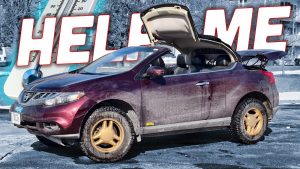Don’t let the EV doomers get you down, the market for electric cars in the United States isn’t shrinking. It’s just not growing very fast. And, sure, hybrids are way more popular and probably softened the demand for electric cars. That happened. But it doesn’t mean that people won’t buy a properly marketed electric car at a good price. Or, probably more accurately, it doesn’t mean that people won’t lease a properly marketed electric car at a good price.
There’s a lot of electric car news this morning to cover in The Morning Dump, including a stat that sort of surprised me: The Honda Prologue is already beating the Chevy Equinox EV and Blazer EV in terms of registrations. I’d expected this would happen, I just didn’t expect it to happen so soon, and it shows that there’s still pent-up demand in certain segments for electric cars.
China, though, remains the key player for electric cars, and there’s been a realization among automakers here in North America that partnering with a Chinese company on battery technology might cause significant headaches down the line. That’s not stopping the world’s biggest batterymaker from not-so-subtly hinting that it would build here if the Trump administration is cool with it. And while we’re on the topic of China, Chinese automaker Geely is starting to rationalize all its random brands.
‘These Numbers Don’t Point To Substantial EV Growth’
Closely tracking electric car sales is annoying because automakers like Tesla and GM only report sales on a quarterly basis, and even then those models aren’t always broken down. Thankfully, S&P Global Mobility can pull registration data by month and get a better glimpse into the market at a specific model level. The only downside to this approach is that there’s a serious lag, so we’re just getting September data.
Overall, it’s about what you’d expect. Both Rivian (possibly due to supply shortages) and Tesla (due to competition and maybe anti-Musk sentiment) are down, but the overall market was up about 1.3% year-over-year. Is this slipping because of hybrids? Yes.
As Automotive News points out:
“These numbers don’t point to substantial EV growth in the next five, 10 years unless things change,” said Tom Libby, an analyst at S&P Global Mobility.
The reelection of former President Donald Trump could take pressure off automakers to sell EVs in the short term if emissions standards are relaxed, Libby said, “even if the long-term trend toward lower emissions is inevitable.”
One key reason why recent EV growth has softened in the U.S. is the growing popularity of gasoline-electric hybrids by automakers such as Toyota and Honda, Libby said. And more brands are developing hybrid models in response to record consumer demand, he added.
That five-to-ten years line is rough, especially given that automakers will continue to produce and release all these electric cars they’ve already planned. Between Kia and Genesis, I’m already expecting a handful to come out at the LA Auto Show later this month. Without some sort of big, cheap offering and with the possibility that the Trump Administration reverses course on environmental issues I think the view is generally correct.
At the same time, I think it’s likely we’ll see more hybrids and that’ll perhaps help lower emissions across the board.
Honda Prologue Outsells Blazer EV, Lyriq EV, And Equinox EV

Earlier this year I remarked that a vehicle like the Honda Prologue could be an indicator that there are still pockets of demand for electric cars:
I think GM and Ford have worked hard trying to push their EVs, but the next traunch of people most inclined to buy the current generation of EVs and hybrids are probably looking to buy something from either Toyota or Honda. Toyota has great hybrids but a mediocre EV. Honda has good hybrids and now, it seems, a decent EV.
I’m really curious to watch Prologue sales. Given the current projections, it’s not likely that Honda will sell more than 50,000 of these in 2024, which puts it in the Mach-E territory. That’ll help juice the market, but it isn’t an overwhelming number. But if Honda can be a success with a perfectly fine EV I think it’ll show where the demand is. If it fails and spurs more hybrid growth, it’ll also show where the market is.
Either way, the Prologue is maybe the most important electric car of 2024.
September registration data from S&P Global Mobility, linked above from Automotive News shows some interesting findings. Here are the biggest-selling EVs that month as estimated by registrations:
- Tesla Model Y – 27,260
- Tesla Model 3 – 19,040
- Tesla Cybertruck – 4,278
- Hyundai Ioniq 5 – 4,240
- Ford Mustang Mach E – 4,180
- Honda Prologue – 4,116
- Chevrolet Equinox – 3,925
- Cadillac Lyriq – 2,723
- Chevrolet Blazer EV – 2,670
- Rivian R1S – 2,403
I feel a lot better about my prediction now. The Equinox and Prologue are both relatively new to the market so it’s not entirely possible to say both were fully on sale in September, but it does seem that way. Every other vehicle on this list was definitely fully on sale by September.
Most of the registrations of the non-Tesla vehicles are probably leases so I think comparing the Prologue to both the Blazer EV and Lyriq, which share a common platform with the Honda is fair. In particular, I think that the success of the Honda compared to the mostly identical Blazer EV is a big deal. The Blazer EV has been on sale for a while and should stand up to the Honda.
Why doesn’t it? I think the lack of CarPlay doesn’t help, but it’s probably just a brand thing. There are people who associate Honda with higher quality vehicles and like Hondas better. The fact that it’s a primarily GM-engineered vehicle doesn’t seem to bother consumers. Of course, the Honda is new to the market and there’s probably some pent-up demand from Honda diehards for a Honda EV, so we’ll have to see if this holds.
CATL Would Build A US Plant If Trump Is Cool With It
Mega Chinese batterymaker CATL has been the target of somewhat bipartisan resistance due to concerns over both security and the risk Chinese companies represent to the global industrial order. It’s probably why Ford has had issues building a JV plant with CATL in Michigan, for example.
Would a Trump presidency maybe pave the way for CATL to come here? Per Reuters, it’s not an impossibility:
CATL, the world’s top battery maker, will consider building a U.S. plant if President-elect Donald Trump opens the door to Chinese investment in the electric-vehicle supply chain, the company’s founder and chairman, Robin Zeng, told Reuters.
“Originally, when we wanted to invest in the U.S., the U.S. government said no,” the Chinese billionaire said in an interview last week. “For me, I’m really open-minded.”
It would surprise me absolutely zero if Trump was persuaded to make a deal that’s been blocked by Republicans on the ground that he’s bringing jobs here. Also, this interview is hilarious, including Zeng telling Elon Musk that Musk doesn’t know how to make a battery:
“We had a very big debate, and I showed him,” Zeng said. “He was silent. He doesn’t know how to make a battery. It’s about electrochemistry. He’s good for the chips, the software, the hardware, the mechanical things.”
Musk and Tesla did not immediately respond to a request for comment on Tuesday.
Zeng said he had also asked Musk about setting unrealistic timelines for the rollout of new vehicles or technologies at Tesla. He said Musk had told him that he wanted to motivate and focus Tesla staffers and that anything beyond a two-year time frame might as well be “infinity.”
“His problem is overpromising. I talked to him,” Zeng said. “Maybe something needs five years. But he says two years. I definitely asked him why. He told me he wanted to push people.”
This actually makes me appreciate the Musk philosophy of constantly overpromising a bit more.
What Is Geely Doing?
Geely Holding Group sits on top of a lot of brands: Zeekr, Lynk & Co., Volvo, Polestar, Smart, Lotus, Nash…
Does this make sense, even in China? Maybe not, so according to Bloomberg the company is going to try and streamline a bit:
Geely’s Zeekr Intelligent Technology Holding Ltd., which in May staged the biggest US listing by a China-based company in three years, will acquire a majority stake in Lynk & Co in a transaction valuing the latter EV maker at 18.33 billion yuan ($2.5 billion), according to a filing.
The integration will curtail some of the cross-competition within the Geely Group, which has been eclipsed the last few years by China’s BYD Co. despite Li having spent more than a decade snapping up recognizable international brands.
Geely also has a large stake in Daimler, the parent company of Mercedes, and owns LEVC, the company that makes the London Black Taxi.
What I’m Listening To While Writing TMD
I still have not recovered from people trying to make Iggy Azalea a thing so when I heard this song from Wynne I was immediately skeptical. I think found out she’s from the Pacific Northwest and I flashed back to Macklemore on the cover of The Source trying to explain that he also thought it was kinda BS that he beat Kendrick Lamar for best rap album at The Grammys. Still, this is pretty good.
The Big Question
Will The Honda Prologue outsell the Blazer EV in Q4?












The pushing and motivation work in the short term. Especially in a small exciting company that’s giving employees nontrivial amounts of equity in compensation along with decent pay. But it burns through people kinda fast, and flat-out doesn’t work at a larger more established company.
““These numbers don’t point to substantial EV growth in the next five, 10 years”
So this faux-expert is basing this on a lower level of growth and isn’t accounting for an economic slowdown and is ignoring the longer term trend?
All this tells me is that there are a lot of self-proclaimed “experts” who don’t deserve to be called experts.
And this guy is one of them.
Trump or no Trump, BEVs will continue to have huge levels of growth globally.
In the next 10-20 years, most of the vehicle market will be BEVs. And by that point, BEVs will likely be cheaper option to buy because of mass production and because they’re simpler compared to making an ICE vehicle safe and pass modern emissions standards.
And within the USA, the fact remains that CARB emissions states still exist and those states will continue to drive BEV growth.
“This actually makes me appreciate the Musk philosophy of constantly overpromising a bit more.”
Why? Do you LIKE disappointment, disgruntled employees and unpaid overtime?
Oh look! Theranos has entered the chat.